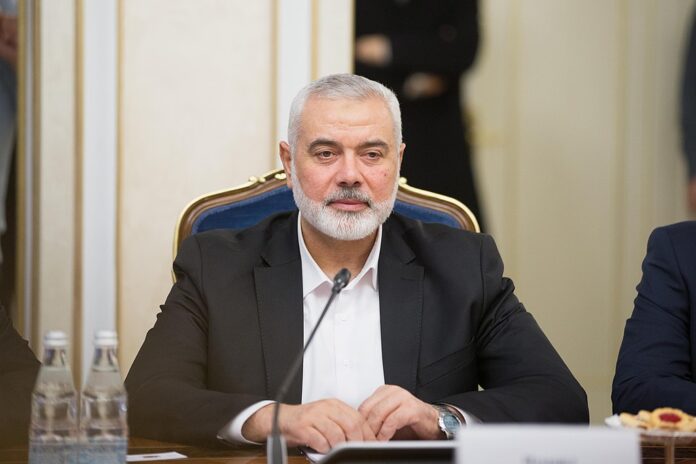Israeli intelligence orchestrates a high-stakes assassination of Hamas’s political leader Ismail Haniyeh in Tehran using explosives planted by Iranian agents
Israel’s Mossad executed a meticulously planned assassination operation targeting Ismail Haniyeh, the political leader of Hamas, in Tehran. Initially, Mossad aimed to kill Haniyeh during his visit to Tehran in May for the funeral of former Iranian President Ebrahim Raisi. However, the plan was thwarted due to massive crowds that heightened the risk of detection and failure, according to Iranian sources who spoke to The Telegraph.
Undeterred, Mossad adapted its strategy and directed two Iranian agents to plant explosives in a guesthouse used by the Islamic Revolutionary Guard Corps (IRGC) in northern Tehran. This location was strategically chosen based on intelligence suggesting Haniyeh would stay there. Mossad’s operatives placed bombs in three different rooms within the IRGC facility.
Mossad, with an annual budget of $3 billion and a staff of around 7,000, is one of the world’s most formidable intelligence agencies. It operates with a high degree of secrecy, employing a network of informants and agents in hostile territories such as Iran, Lebanon, and Syria. The Special Operations Division, or Metsada, is particularly noted for its execution of sensitive assassinations, sabotage, and psychological operations.
According to The Telegraph, surveillance footage obtained by Iranian officials shows Mossad agents moving with precision. After planting the devices, the agents exited Iran undetected but continued to monitor the situation from afar. On Wednesday, at 2 am, they remotely detonated the explosives in the room where Haniyeh was staying, resulting in his death.
Haniyeh was in Tehran for the inauguration of President Masoud Pezeshkian. His assassination has been confirmed by IRGC officials, who suspect that Mossad used operatives from the Ansar-al-Mahdi protection unit. This unit is known for safeguarding high-ranking officials within Iran and abroad.
The assassination represents a significant security breach for Iran and has been described as a humiliation by IRGC officials. In response, the IRGC is contemplating various retaliation strategies, including a potential direct strike on Tel Aviv, with possible involvement from Hezbollah and other Iranian proxies.
The timing of the assassination, coinciding with Pezeshkian’s inauguration, raises questions about the operation’s intent. Pezeshkian, a veteran lawmaker and cardiac surgeon, campaigned on a platform of reform and dialogue, promising to move away from the aggressive policies of his predecessors. However, with hardliners still holding substantial influence and Ayatollah Ali Khamenei retaining ultimate authority, Pezeshkian’s ability to enact meaningful change remains uncertain.
Analysis:
Political:
The assassination of Ismail Haniyeh by Mossad highlights the intricate web of geopolitical tensions in the Middle East. The operation not only underscores Israel’s commitment to targeting Hamas leadership but also illustrates the complexities of its relations with Iran. This incident could further strain Israeli-Iranian relations, potentially escalating conflicts in the region. For President Pezeshkian, who is positioned as a reformist leader, the assassination complicates his efforts to navigate Iran’s internal politics and international diplomacy. The impact of this event on his administration’s ability to pursue a more conciliatory foreign policy is significant.
Social:
The operation has social implications both within Iran and the broader Middle East. For the Iranian public, the assassination is likely to be perceived as a severe affront, potentially inflaming anti-Israeli sentiment and rallying support for hardline factions. In contrast, the operation might be seen as a necessary security measure by some in Israel, reflecting the ongoing conflict between Hamas and Israel. The broader social impact includes the potential for increased instability and violence in the region, as the assassination could provoke retaliatory actions from various militant groups.
Racial:
While the event itself is not directly related to racial issues, it reflects the broader context of Middle Eastern ethnic and sectarian tensions. The operation’s execution by Mossad, an agency with a history of covert operations in diverse contexts, highlights the complex interplay of ethnic and political dynamics in the region. The involvement of Iranian agents in the operation also underscores the multi-layered nature of regional conflicts.
Gender:
The gender dynamics in this context are less prominent but can be examined through the roles of women in the political and security spheres of the Middle East. The focus of the operation on a male political leader and the involvement of predominantly male security and intelligence operatives reflect traditional gender roles in these spheres. The broader implications for gender equality in the region’s political and security sectors remain a critical but less visible aspect of this conflict.
Economic:
Economically, the assassination could have far-reaching effects. For Israel, the successful execution of the operation may reinforce its strategic position but also incur potential costs in terms of retaliation and increased security measures. For Iran, the breach represents a loss of prestige and security, potentially impacting investor confidence and economic stability. The broader regional implications include potential disruptions in trade and economic relations due to heightened conflict and instability.
